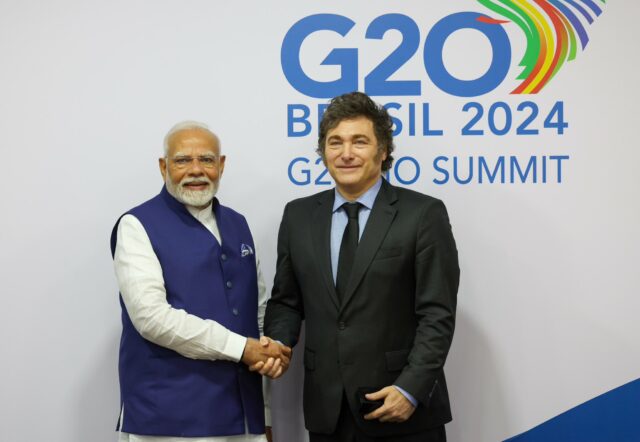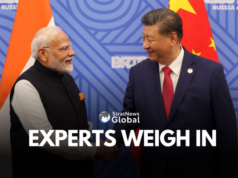
Prime Minister Narendra Modi will be in Argentina on July 4–5 on his first official bilateral visit. His previous visit in 2018 was for the G20 Summit in Buenos Aires. This time, the focus is firmly on strengthening India’s strategic and economic engagement with Latin America’s second-largest economy.
The Ministry of External Affairs said Modi and President Javier Milei will chart a roadmap for cooperation in defence, mining, agriculture, oil and gas, renewable energy, and trade and investment.
75 Years of Bilateral Ties
Argentina’s Ambassador Mariano A Caucino said “We consider PM Modi’s visit very important considering India’s growing influence in the world—having become the fifth-largest economy and the world’s fastest-growing economy.”
“We celebrated the 75th anniversary of our bilateral relations in 2024. Our friendship is based on common values and mutual benefit.”
Argentina is already a key player in India’s food security, particularly through sunflower and soybean oil exports. But Caucino sees much broader potential.
“The trade between our two countries is valued at around $5 billion. Argentina is a very secure provider in terms of food and energy security—especially because of our location in a peaceful region with no major geopolitical tensions,” he noted, and pointed to India’s growing presence in energy and mining sectors.
“Indian companies are actively exploring for lithium in Catamarca province, and there is increasing cooperation in oil and gas. Earlier this year, our national energy company YPF signed agreements with Oil India, GAIL, and ONGC to begin LNG exports to India.”
“Argentina can become a provider of energy security just as we have been in providing food security.”
Complementarities
Argentine academic Prof Manuel Gonzalo, noted that “Modi’s return to Argentina after his 2018 visit for the G20 Summit is significant. This time it’s a bilateral visit, and that’s very important for the relationship. It shows that despite Argentina not joining BRICS+, India still considers it a strategic player in the region,” he told StratNewsGlobal.
He pointed out that trade has been consistently strong and holds room for further growth.
“India is often among Argentina’s top five export destinations, especially because of soybean and sunflower oil. Argentina also exports agricultural machinery, chemicals, and gold. On the other hand, India’s rapidly expanding middle class and green transition make Argentina an increasingly attractive partner.”
He underscored Argentina’s unique strengths, “India needs to diversify its energy mix—cheaper, cleaner, and safer sources. Argentina fits in perfectly with its vast oil and gas reserves from Vaca Muerta and rich lithium deposits in the northwest.”
He acknowledged the challenge of stalled trade negotiations under the MERCOSUR-India framework.
“MERCOSUR is facing internal tensions, particularly between Argentina and Brazil. Smaller members like Uruguay are already leaning toward bilateral FTAs. For India, a bilateral agreement with Argentina may be the more practical path forward.”
India’s Strategic Shift
India’s growing engagement with Latin America was recently highlighted at the India–Latin America & Caribbean Conclave hosted by the Observer Research Foundation (ORF).
The conclave spotlighted lithium battery manufacturing, climate-resilient agriculture, biotech, and clean energy partnerships—underlining India’s broader intent to view its Latin American engagement through an Indo-Pacific lens.
This shift comes as China’s presence in the region grows, particularly in critical minerals and infrastructure.
Defence and Tech Cooperation
The upcoming visit is likely to include discussions on expanding defence cooperation, possibly through joint manufacturing and technical training. Science and technology cooperation is also emerging as a priority. As Manuel noted.
““The challenge is to go beyond bulk trade—toward strengthening STI cooperation in nuclear, biotech, space, and university-to-university exchanges. There’s a huge opportunity here.”
The bilateral complementarities are clear: India’s demand for energy, food, and innovation matches Argentina’s strengths in supply and stability.
Prime Minister Modi’s first visit underscores that in a more multipolar world, new partnerships will shape the future of trade, energy, and diplomacy.




